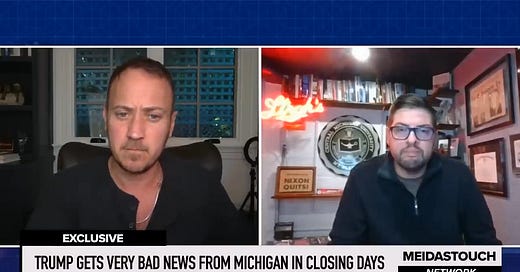In a recent interview on MeidasTouch, Ben Meiselas discussed Michigan’s shifting political landscape with Chad Livengood, politics editor for The Detroit News. As early voting surges across the state, new polling data reveals a 3-point lead for Vice President Kamala Harris over Donald Trump, and her lead is further represented by a significant gender gap and recent GOP endorsements that are likely to impact the final vote.
According to Livengood, the gender gap in Michigan’s electorate is one of the largest in recent history, with Harris leading among women by a margin of 58-34 and Trump leading among men by 55-34. This disparity highlights a challenge for Trump, who not only trails among women voters but also faces a statewide female voter population that surpasses male voters. This gender gap aligns with early voting trends, as a notable number of absentee and early ballots have been cast by women, giving Harris a clear advantage even before Election Day.
Another factor contributing to Harris’s edge is an increase in prominent Republican figures endorsing her campaign. Rusty Hills, former Michigan GOP Director, and Congressman Fred Upton, who famously voted to impeach Trump, represent a growing faction of old-guard Republicans supporting Harris over Trump. Livengood noted the surprising nature of these endorsements, particularly given Hills’ long-standing involvement in Michigan’s Republican establishment. This shift within the old-guard Michigan GOP suggests an erosion of Trump’s influence among traditional Republicans who are increasingly prioritizing democratic integrity over party loyalty (the chaos within the redefined MAGA Michigan GOP now running the party tells a different story).
Economic concerns also play a central role in Michigan’s voter sentiment, especially in manufacturing-dependent communities. While Trump campaigns on a platform that disparages the Inflation Reduction Act and clean energy initiatives, Michigan’s recent economic revitalization tells a different story. With the Biden-Harris administration’s support, significant federal investments are creating thousands of clean energy jobs in places like Saginaw County. The construction of new semiconductor and solar wafer facilities promises a transformative impact on Michigan’s economy, particularly in areas struggling with manufacturing job losses.
Livengood highlighted the contrast between Harris’s detailed policy achievements and Trump’s recent rallies, where he criticized Detroit and promoted false narratives. One instance saw non-auto workers at Trump’s rally wearing “Auto Workers for Trump” shirts. This incident, combined with Harris’s economic policies directly benefiting Michigan communities, manufacturing, and union workers, has led many voters to question Trump’s messaging.
As Michigan prepares for Election Day, Harris’s sustained polling advantage underscores the importance of voter turnout. With nearly half the state’s ballots already cast, Michigan’s election may ultimately be decided by a blend of gender dynamics, policy impacts, and a fractured GOP.
We are providing this interview here for you free-of-charge without any advertisements, exclusively on Meidas+. If you are able to support our work, consider becoming a paid subscriber today.
















Share this post